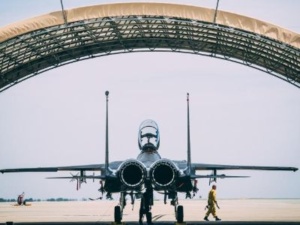Much of the aviation industry in North Carolina is upbeat about the prospects of 2022…

WHY AEROSPACE?
North Carolina is home to a vibrant and diverse military, commercial and general aviation aerospace industry, with assembly, manufacturing, engineering, operations and service providers statewide. The NCMBC is the go-to organization to support large and small North Carolina businesses with supply chain and contracting opportunities in the federal aerospace market. Military aviation and aerospace manufacturing and repair and overhaul account for about 80,000 jobs in North Carolina. "I think there's still a lot of strength, a lot of optimism in the aerospace industry, even through the pandemic," said Fennell.OPPORTUNITIES AND EVENTS
Whether your company is involved in the latest technological advancements, provides supply support, logistics services or a wide variety of other products or services, opportunities in aerospace abound in the federal market. The NCMBC works closely with partners in the federal government to understand federal requirements and match them with state companies that have the capability to fulfill these requirements, according to Joe Tew, business development professional with the NCMBC. The recent pandemic highlighted the benefit of companies having a diversified portfolio including commercial and federal customers. While commercial aviation saw a large decrease in demand during the pandemic, federal government demand stayed steady or grew in some instances. The NCMBC is available to support businesses as they break into the federal market and provide that diversification. During the shutdown associated with the pandemic, the NCMBC embraced virtual platforms and offered aerospace-focused webinars. These included a webinar series on business opportunities with DLA Aviation; and a series on International Business Opportunities in conjunction with the North Carolina Defense Industry Diversification Initiative; as well as a variety of technology-related webinars led by the Defense Technology arm of the NCMBC. Now, with pandemic restrictions easing, the NCMBC Aerospace team will be hosting the Southeastern Opportunities in Aerospace Regional Summit on Nov. 16 through 17 in Chapel Hill, with sessions on everything from technology developments and economic development initiatives to business development opportunities. The NCMBC expects a cross-section of individuals from the federal government, state government, aerospace manufacturers, small business providers and supporting partners to attend the event.STATE-WIDE FOCUS
"We see great opportunities for a state-wide program to support Aerospace Initiatives and Growth," said Mary Beth Fennell, an Aerospace Strategic Industry Specialist with the NCMBC. Added Tew, "When it comes to these aerospace initiatives, let's make it statewide, because we know that if we're able to bring all those capabilities together, that gives North Carolina a stronger offering, not only to commercial aviation but also to the Department of Defense." To that end, NCMBC works closely with the NC Department of Transportation Division of Aviation, the N.C. Department of Commerce, the Economic Development Partnership of N.C. and regional economic developers to develop and execute a statewide vision and strategy that aids in supporting and facilitating synergistic relationships. Multiple economic development partnerships exist across the state, each with robust programs to support aerospace and manufacturing providers.EMERGING DEVELOPMENTS
The aerospace industry is never stagnant, and local companies with relevant operations should always monitor the industry to stay abreast of key developments that will drive new opportunities and growth. According to Tew and Fennell, there are numerous opportunities for North Carolina businesses to get involved with the fast-growing industry. "The Department of Transportation division of aviation is focusing more on the very small vehicles that might be delivery services," said Fennell. "The military, on the other hand, has systems that they currently have that are remotely piloted, and they have some very large systems they're working on, too." "Generally, what we're asking platforms and aerospace to do is we want them to go faster, we want them to go farther, we want them to carry more, we want them to do more missions, and we want them to do it with fewer resources," said Tew. "In addressing that need, we're seeing plenty of opportunity across the state." At the NCMBC, some of the developments currently being monitored include:- New materials to enable aircraft to be lighter and more fuel-efficient
- Advances in vertical lift technology to increase the versatility of aircraft systems
- Growth of Remotely Piloted Vehicles (RPV) and Unmanned Aerial Vehicles (UAV)
- Establishment of Space Force to protect the country and its allies in space and provide space capabilities
